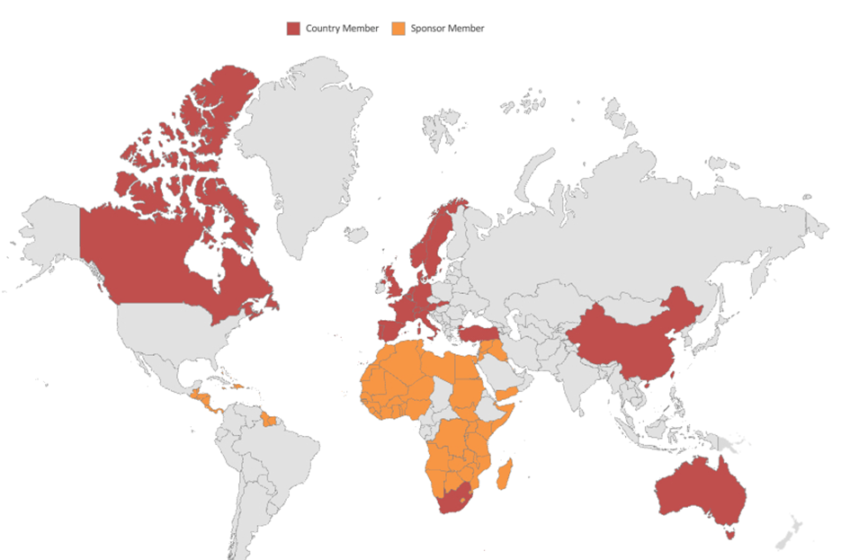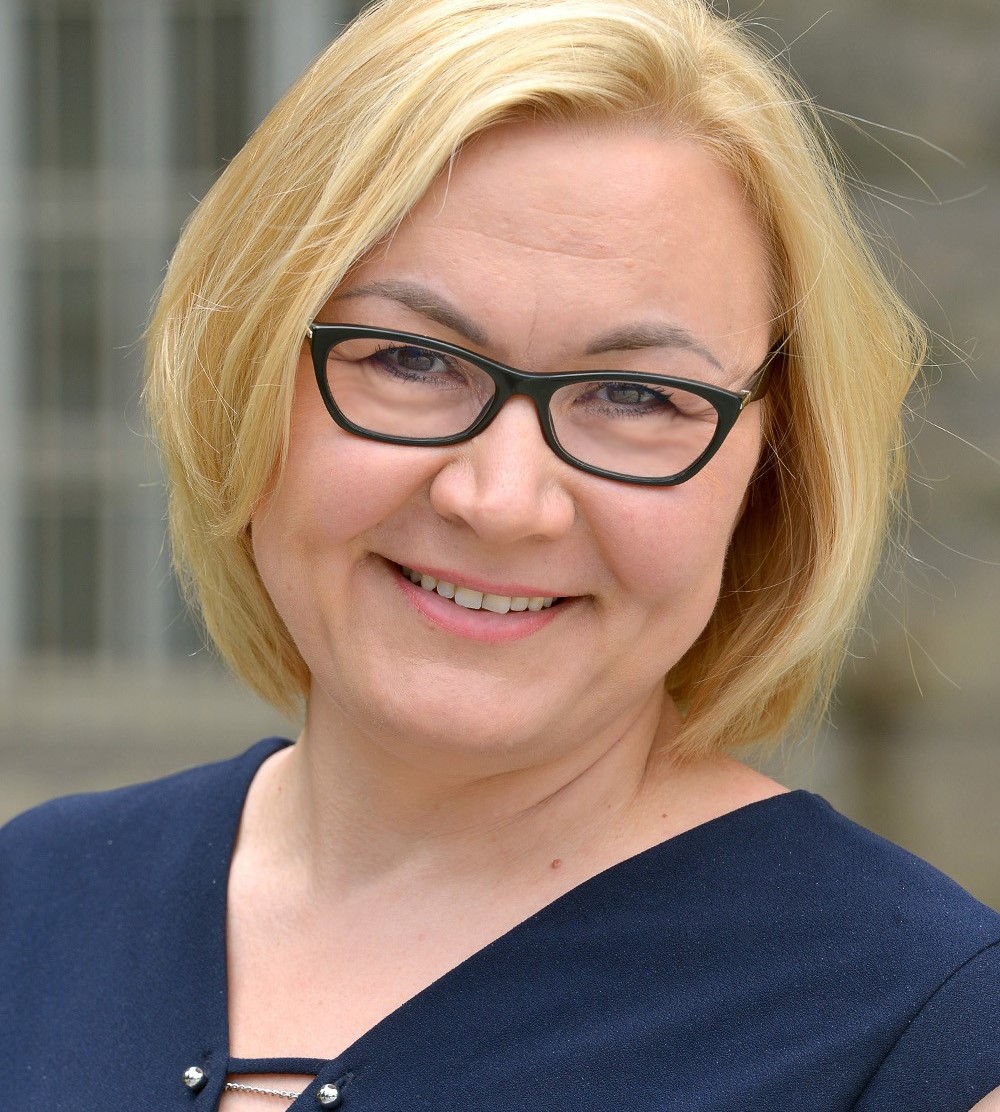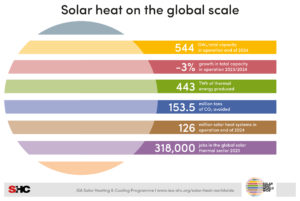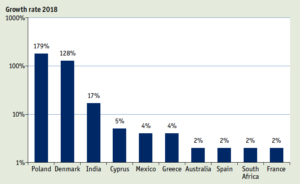Poland becomes 20th member country of IEA SHC
August 4, 2024
The addition of Poland will extend the circle of member countries and organizations of the IEA SHC programme. Currently 19 countries (marked in red) and 8 international organizations (marked in orange) representing Africa, the Middle East and the Caribbean are IEA SHC members. We spoke with Justyna Martyniuk-Pęczek, Associate Professor at the Gdansk University of Technology, who has supported the accession of Poland to IEA SHC since 2019. Having the largest district heat capacity in operation in the EU, Poland has the challenge of implementing the Energy Efficiency Directive (EED). One of the key EED articles is 24(1) with the definition of efficient district heating and cooling systems, which describes the way towards decarbonization by 2050 by increasing the share of renewables and waste heat in several steps.
Source: IEA SHC

Justyna Martyniuk-Pęczek, newly nominated Polish representative at the Solar Heating & Cooling Programme and Associate Professor at the Gdansk University of Technology. She has led the Light and Energy research group, and since 2023 also headed the international Research group – SUP&ER – Solar Urban Performance and Energy Efficiency.
Photo: Gdansk University of Technology
What are the advantages for Poland in becoming a member of the IEA SHC Programme?
Martyniuk-Pęczek: I believe that participation in this programme will significantly strengthen Poland’s capacity to achieve the objectives outlined in the Energy Efficiency Directive (EED). According to the report “EU Tracker – Local heating and cooling plans in Poland” – https://energy-cities.eu/countries/poland/, Poland is not ready for the smooth implementation of the EED. This poses a significant challenge at the national, regional, and municipal levels. The membership of the IEA Solar Heating & Cooling Programme will enable better preparation for implementing advanced energy technologies and strategies. Additionally, involvement in the programme can help secure funding and technical support for the development of solar energy and heating projects, which in the longer term will benefit both the economy and the environment in Poland.
Poland was the fourth largest solar heat market in Europe in 2023, after Greece, Germany and Italy. How will the solar thermal sector profit from the IEA SHC membership?
Martyniuk-Pęczek: Poland’s accession to the IEA SHC will bring numerous benefits for both academia and business. Firstly, it will enable all interested groups to participate in international projects, facilitating the exchange of experience and knowledge regarding local conditions and best practices in solar energy and energy efficiency. Among our specialists in relevant fields are individuals who bring extensive business experience and international work backgrounds and are prepared to participate in diverse forms of collaboration. Through collaboration with experts and institutions from other countries, Polish entities will be able to draw upon their expertise, potentially leading to faster and more efficient implementation of innovative solutions.
You have already worked as a guest on IEA SHC research platforms. What was your experience?
Martyniuk-Pęczek: Collaboration between different national research groups, as is possible within IEA SHC, is an enrichment. It allows you to look at problems from different perspectives and try to find connections between solutions and identify potential obstacles. I am an architect by education and professionally I work in urban planning. I work at both the building and neighbourhood scales, as well as on strategic urban development programmes.
Thus, my interest in participating in the SHC Programme is mainly focused on finding solutions to foster energy efficiency on the architectural and urban scale. Currently I am joining Task 70 on Low Carbon, High Comfort Integrated Lighting. Within the framework of this project, I would like to analyze urban-scale solutions that simultaneously reduce CO2 emissions and ensure the well-being of residents.
How long did it take you to get the government to listen to you about IEA SHC membership?
Martyniuk-Pęczek: As early as 2019, I began my initial attempts and contacts with the Ministry of Energy at that time. Meanwhile, there has been restructuring and reorganization of ministries. Eventually, responsibility for international cooperation was transferred to the Ministry of Climate and Environment. I was not the only one. There were a lot of grassroots initiatives with people expressing their desire to participate in one or other of the IEA Technology Collaboration Programmes (TCPs), often from internationally active research groups. These numerous attempts aroused the interest of the Polish government.
What has created the momentum for membership right now?
Martyniuk-Pęczek: The momentum towards integrating Poland into IEA TCPs intensified last year. In March 2023, the Polish TCP Coordination Day was organized. A number of TCPs were presented, among them Bioenergy, PVPS and Wind Energy. The focus was mainly on sectors identified as priorities in the national policy Energy Policy of Poland until 2040.
At the same time, other people were invited who would be interested in participating in other TCPs such as SHC or Energy in Buildings and Communities (EBC). The purpose of the meeting was to promote participation in the different TCPs and monitor interest from experts, business and academia. The terms of cooperation and opportunities were discussed. Different forms of financing for participation in the programme were also searched for. In the subsequent period, documents were prepared, e.g. forms of agreement between the government and delegated institutions.
You have been nominated to represent Poland in the IEA SHC Programme. When was that decided?
Martyniuk-Pęczek: The formal basis developed in 2023 made it possible to apply for the TCP SHC programme. The decision-making process was then temporarily halted by parliamentary elections in autumn 2023. However, by January 2024, progress resumed with the procedure to establish cooperation between the Ministry of Climate and Environment and Gdansk University of Technology as a delegate of the Polish government within the IEA SHC Programme. By May 2024, all formalities had been finalized, initiating Poland’s application to SHC with Gdansk University of Technology appointed as the delegated institution.
The Interview was carried out by Bärbel Epp.


